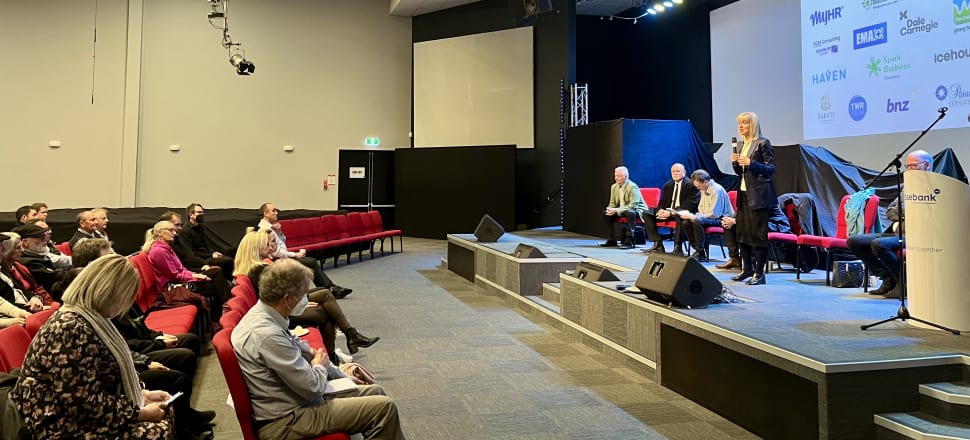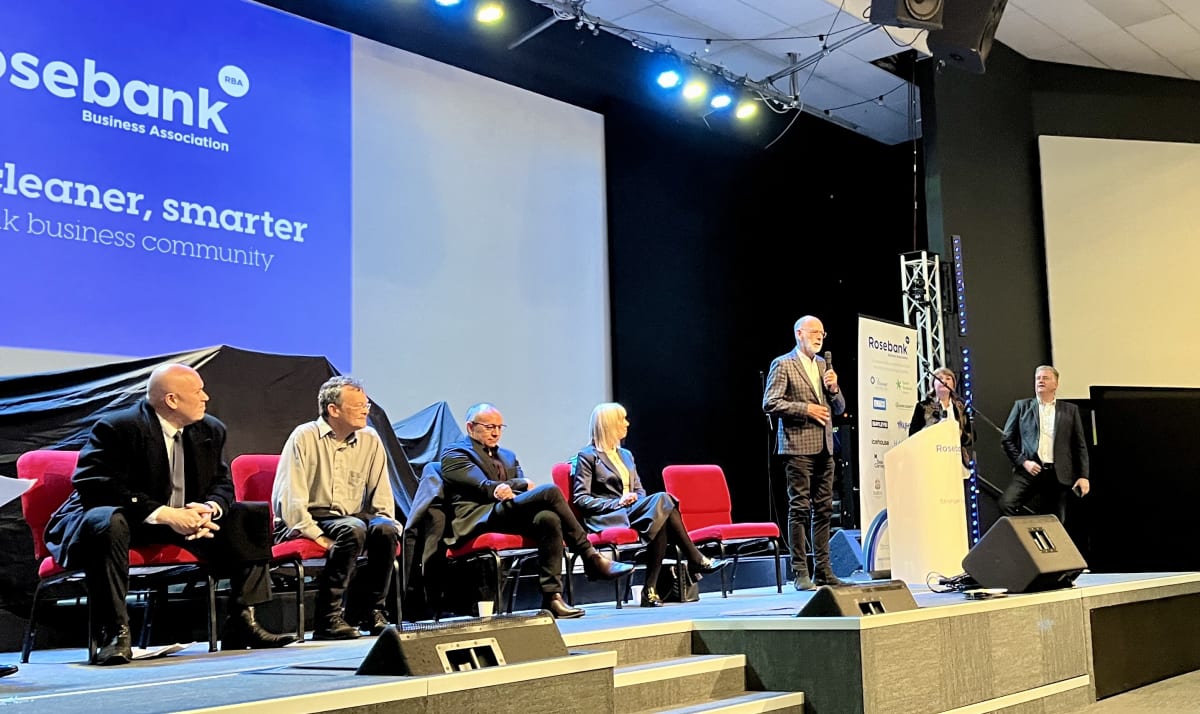
With the departure of Leo Molloy, Viv Beck and Wayne Brown are both jockeying for the favour of centre-right voters
There was no love lost between mayoral candidates Viv Beck and Wayne Brown at a meet-the-candidates breakfast event when faced with questions around the relationship between council and business associations.
The event, hosted by the Rosebank Business Association on Tuesday morning, saw six candidates giving their best job interview performance for mayor.
Present were Beck, Brown, Gary Brown, Ted Johnston, Michael Morris and Craig Lord - while current frontrunner Efeso Collins was absent as he was speaking at a conference for youth workers.
It’s the first major event on the campaign schedule for candidates following the confirmation of the 22 names in the race, and the first as the dust settles following the sudden surrender of controversial candidate Leo Molloy last Friday.
After the newest Ratepayers' Alliance-Curia poll had Molloy in third place, behind Efeso Collins and then Wayne Brown in second, the former jockey-turned-restauranteur threw in the towel, citing a trend suggesting he couldn’t win.
His absence has released a good amount of the centre-right votes he had sponged up over the past few months, and now there’s a relatively open field for centre-right frontrunners Brown and Beck, who came in at 19 percent and 13 percent respectively in the last poll.
There’s an idea that Molloy fell on his sword so as not to split the vote on the right, and now people are suggesting Beck do the same.
But on Tuesday morning she was resolute she would not give in to these suggestions, and was ready to compete with Brown for the votes.
“Yesterday you might have heard a former mayor say I should stand down,” she told an audience of around 70 people at the breakfast, referring to the comments of former mayor John Banks to RNZ on Monday. “I am not standing down.”
Two-time former Far North mayor Wayne Brown had some choice words for Beck, levelling accusations at business associations of hoarding public funds.
“I've been through the system and it's surprising how much money some of them are putting aside,” he said. “The CBD one has got over $1.5 million dollars sitting in the bank, and you think - what have you got that for?”
As downtown business association Heart of the City’s CEO, Beck accused Brown of lying and talking about things he had no knowledge of.
Brown said living in the CBD, he has noticed a lack of security funding by the business association, and was quick to knock down Beck’s interjections.
“I live there, and you run a bad one, I'm sorry to tell you,” he said.
It was enough of a set-to to prompt Rosebank Business Association board member and event organiser Michelle Maitland to ask for mutual respect between candidates.
In response, Beck cast shade on Brown’s ability to get on within an organisational structure.
“The reality is I do not believe the behaviour we saw before is actually the way to get things done in council,” she said. “It is not the way to build the city we need to build, because you actually need to care about people, you have to respect people, you have to listen to different perspectives and make clear decisions and work with those councillors.”
She appealed to her history of working within organisations like Heart of the City as experience relevant to the mayoral role.
“I can tell you, I’ve worked in a large organisation - he says I haven't, but I have - and the reality is, the bureaucrats will fight being told what to do unless it's done well, so will the politicians. You have to work well with people.”

But despite the differences of opinion, there wasn’t a huge display of differences in policy up on the stage.
When former Waitakere mayor Sir Bob Harvey asked who would review the worth of the Super City, all of the hands went into the air bar Ted Johnston, who made a kind of seesaw gesture and said he would look at it, but couldn’t make promises beyond that.
“Look at that, they all want to be mayor,” Harvey said as the hands went into the air.
The event was a chance to shine for some of the lesser-known candidates, without Collins or Molloy in the spotlight.
Hibiscus and Bays Local Board chair Gary Brown said he was used to being up against the big boys, having battled the Los Angeles Council to keep Orewa’s walk of fame, a series of star plaques in the seaside town paying tribute to acts like Ray Columbus and Sir Howard Morrison.
He also referenced another wrangle with Hollywood legal teams, which lead to him being the only legally sanctioned Austin Powers impersonator in the world.
It seemed he doesn’t expect the Mike Myers character to help his mayoral chances however, as he kept the details vague when he addressed the morning crowd.
“I got authorised by a major film company in America and I’m the only one in the world that can do this particular character that I do for a living,” he said.
He said he would be a hands-on mayor, coming down to each business association and dealing with their issues.
“I’m not going to be sitting in the office hiding away, I want to be out and about with all the local boards, all the different groups and associations and say what can we do.”
Craig Lord also promised the association his direct attention should he be successful in his run at mayor, and even offered Gary Brown a job as his commissioner to local boards.
“I love local boards… but they need more teeth,” he said. Lord’s platform looks to decentralise power over the city and away from the bureaucrats and so-called “ivory tower” on Albert Street.
“It’s not the job of the mayor to stand up here and say I’m going to do this for you, but what I will do is change the system so it works for you,” he said. “The way to do that is from the inside. We completely overhaul this long useless Super City system that needs a refresh.”
Being in front of a business association, there was a lot of talk about the council’s relationship to them.
The associations under the business improvement district programme work with the council to improve the local business environment and grow the regional economy.
There are 50 such associations in Auckland, representing more than 25,000 businesses with a combined value of around $24 billion.
One question the audience seemed enthusiastic to hear an answer to was about changing the culture of getting things done within the council.
Beck said accountability from council and CCOs begins with changing the expectations set at the top, but it’s not an immediate process.
“You can’t just flick a switch and people will change their behaviour,” she said. “The culture will change when the expectations are set and they have to deliver on them.”
Brown said the council’s current culture is to not make decisions, to which he would make dramatic changes at the top.
“The current Auckland Council is lead by a mayor who Helen Clark says his middle name is cautious,” he said.
Animal Justice Auckland representative Michael Morris said it was important that people felt they could get in touch with somebody from council about their issues.
“One bugbear of mine is when I noticed there was a manhole - well, a person hole you probably call them now - that was loose and a disaster waiting to happen,” he said. “But calling Auckland Council and getting someone to [fix] it, you get put on hold, and you get that awful music. You don’t get to choose the music you like. You can never get the right person. In the end I gave up.”
He wants more frontline customer service staff and “fewer dead wood at the top”.
Meanwhile, Ted Johnston referred to his experience as a lawyer and business owner as giving him the people skills to navigate the ins and outs of local government.
“It’s just like in dealing with business - don’t run a business if you can’t smile,” he said.
He called on the audience to vote in a mayor who knows their powers and how to use them, before ending with what seemed like a veiled threat to central Government should they meddle in the affairs of Johnston’s Auckland.
“I’ll be able to use diplomacy to work with the Government, but where they don’t work with us - I’ll tie them up with such a maze that they will never achieve anything.”
Now that the candidate lists for the mayoralty are set in stone, the competitive public job interviews are just beginning.
Collins’ media team said he’d attended 20 events so far, with 30 to go before election day.
So while there may be a gnawing urge to sprint ahead in the back of every runner’s mind, there is still a long way to go in the race for the mayoralty.







